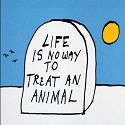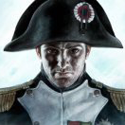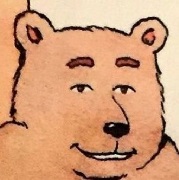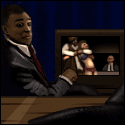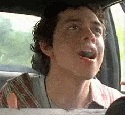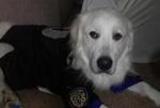|
A friend of mine lent me his kindle and one of the books I've read so far is Anne Franks Diary, like most people I already knew the basic contents given its popularity and how it came to be written, but it was still a very surprising read. Despite many of her entries being rather mundane or optimistic, it really hammers home the brutal tragedy of the Holocaust. In one passage that really got to me involved an off the cuff remark about cremation. And what makes it all the more depressing is that WWII was being won and Anne knew it, she broke up her recounting of life in the safe house with her joy on hearing the gradual downfall of the Axis from the assassination attempt on Hitler to the D-day invasion. Format wise its a lot like Agnes Humbert's Resistance though that at least had a happier resolution.
|
|
|
|

|
| # ? Apr 23, 2024 08:21 |
|
Crossposting from the What Did You Just Finish? thread:Gertrude Perkins posted:Blackshirts and Reds: Rational Fascism and the Overthrow of Communism by Michael Parenti. A well-argued and passionate history of 20th century geopolitics and politico-economics, charting the close ties between fascism and corporate capitalism from Mussolini and Hitler's rise to power to the mid-1990s. Rejecting a lot of past and contemporary anti-communist narratives, which he describes as dogmatic and propagandistic, Parenti discusses the fallacious approaches to communism and socialist states. From big-business sponsors of American imperial overreach and fascist dictatorships to anti-communist liberals, there are few who escape his criticism (and in some cases, personal grudges, as laid out in some particularly fun footnotes). I really wanna read his more recent stuff, too. Something about his style really gels with me.
|
|
|
|
Junkie Disease posted:1776. I knew little about the revolutionary war i had to do it. Gertrude Perkins posted:Crossposting from the What Did You Just Finish? thread: Thanks for the crosspost this looks really interesting to me.
|
|
|
|
Despite being aware of Jon Ronson and his work, So You've Been Publicly Shamed, is the first of his books I've read. I really enjoyed his personal kind of journalism - it especially works when dealing with shaming because it humanizes the victims. I really felt like I was along for the ride as he pursued different angles of thinking. I've always found it kind of dark when I'd see people online calling for someone's job. A person tweets something stupid and suddenly their livelihood is being screamed for. In this book you hear about the repercussions of this kind of online 'justice'. It's a troubling, but interesting read, and it really holds up a mirror to ask us, the 'public', how we are abusing our power. Does anyone have any recommendations of writers along the lines of Ronson? Louis Theroux doesn't have any books does he...
|
|
|
|
Hocus Pocus posted:Despite being aware of Jon Ronson and his work, So You've Been Publicly Shamed, is the first of his books I've read. I really enjoyed his personal kind of journalism - it especially works when dealing with shaming because it humanizes the victims. I really felt like I was along for the ride as he pursued different angles of thinking. Yes, yes he does! And as for Ronson, I've not read his new book, but I've heard it pales in comparison to his earlier stuff - The Psychopath Test is really engaging, I've heard good things about Lost At Sea and my personal favourite is still The Men Who Stare At Goats.
|
|
|
|
I'd actually say that Ronson's best work is actually done through his BBC radio show, and he was kind enough to make it available for free directly through his website. The titles are misleading though, a lot of them are just jumping points for various stories hes come across and investigated along with interviews with the people involved in them.
|
|
|
|
Has anyone here read the Kotkin biography of Stalin? Was it any good? I like the idea of a biography which doesn't try to reduce everything to psychology.
|
|
|
|
Roydrowsy posted:Jon Ronson has some really interesting stuff. Hocus Pocus posted:Despite being aware of Jon Ronson and his work, So You've Been Publicly Shamed, is the first of his books I've read. I really enjoyed his personal kind of journalism - it especially works when dealing with shaming because it humanizes the victims. I really felt like I was along for the ride as he pursued different angles of thinking. I enjoyed reading this article on Vice with Jon Ronson and Adam Curtis and consequently obtained the audiobook of So You've Been Publicly Shamed. I've found it really interesting, and his personal narration of the book was pretty entertaining too, taking the time to explain the few photos that are in the book so you don't miss out on those either. It is not so much an instruction guide as the title suggests, but mostly a series of interviews with the shamers and the shamed. I'll probably have a look at other things he wrote because I really liked it, possibly the best book I've read, or rather, listened to in the past few years.
|
|
|
|
I picked it up due to the latest farce over Cecil the lion. Interested to see what he has to say.
|
|
|
|
I recently finished Dude Where's my Country? by Michael Moore. Written in 2003 just after the invasion of Iraq, its a very interesting look back at a some recent history and he makes some very shocking revelations, including senior Democrats telling him they'd written off the 2004 elections. I think it demonstrates Moore at his best and his worst, theres jokes that aren't funny and distracting, the clever ideas that get a bit overused, the clash between his idealism and what he sees as pragmatism. Still its short and most of his points and allegations are backed up with plenty of citations. Worth a read if your memories abit hazy about the early 2000's.
|
|
|
|
I recently finished both You are not So Smart and You are Now Less Dumb by David McRaney. Both books list the many ways in which our minds fool us, it was pretty interesting. Every chapter stands on its own pretty much, so you can read them in any order you like. Also noticed a reference to Jonah Lehrer, who at this point was not yet outed as a fraud, which I read about in Jon Ronson's So You've Been Publicly Shamed. And of course the Stanford Prison Experiment, which both books mention. Pretty neat to have statements from one book be put in a different light by another. David McRaney's books were accessible but not very deep, due to the quantity over quality approach. In total, 65 different fallacies were discussed. I'm not sure how accurate everything was. Despite that, I think it was good basic introduction on the many ways in which you cannot trust your own mind. There's a big overlap between logical fallacies used in debates and the ones caused by the mental shortcuts our brains take. So now I have a craving for a book or two about logical fallacies. Is it okay to ask for a recommendation in this thread?
|
|
|
|
Cross-posting from the recommendation thread. Not sure if this is the best place to ask but I recently watched the movie Selma and I've become really fascinated by the relationship between MLK and Malcolm X and the ways in which their views conflicted and I want to learn more. There are a million bios of both of them out there, but does anyone know of any good books that specifically delve into them both as a pair?
|
|
|
|
Just finished the audiobook Surfaces and Essences by Douglas Hofstadter and some French guy. I really liked it, but it gets samey at certain points and my advice is that once you feel like they're not really talking about anything new, there's no reason not to move on to another book. You won't be missing much once you understand the basic premise and the range of examples. Modern Romance by Aziz Ansari is pretty good so far. Light-hearted but also contains real research that I did not expect, and looks at some stark sociological differences between relationships now and relationships in, say, the 50s. Learning more than I thought I would and I'm barely a quarter of the way through. I have Life Unfolding on hiatus, and my parents thought it was boring, but I think it's really interesting.
|
|
|
|
Here's another frustrating and troubling politics book I read last weekend. It's becoming a theme with me.Gertrude Perkins posted:The Clothes Have No Emperor: A Chronicle Of The American 80's by Paul Slansky. A blow-by-blow (and sometimes even day-by-day) history of the Reagan presidency, serving as a catalogue of the bizarre mediatised waking nightmare of the 80s in American politics. The daily format gives Slansky room for plenty of juxtaposition, narrative threads and continuity, and makes it a pretty zippy read (I finished it over the weekend). There's plenty of decent snark to temper the sense of staggering frustration and dread that comes from having almost every major event of the Reagan administration laid out in sequence. Equally infuriating is the campaign coverage, with figures like Michael Dukakis eagerly snatching defeat from the jaws of victory. It's available as an eBook for pay-what-you-want, and it's definitely worth your time.
|
|
|
|
I've been reading a lot about diseases and epidemics, lately. Because apparently nonfiction is fun as long as it's terrifying. They're listed from what I enjoyed most to what I enjoyed least. Asleep by Molly Caldwell Crosby is my favorite so far. It deals with Sleeping Sickness (a type of encephalitis) and the fact that we're...still not really sure what happened there. The Coming Plague by Laurie Garrett is really long, but deals with a ton of post-antibiotics epidemics. It also goes into the way that public health, politics, and the environment intersect when dealing with epidemics. It's the perfect book if you want to spend a few weeks telling anyone who will listen to you things that they were probably more comfortable not knowing. The Dancing Plague by John Waller deals with the religious/cultural/political issues that have surrounded dancing epidemics, particularly the one in 1518. It was very readable and very informative at the same time, particularly in the last chapter where it deals with other bizarre outbreaks like that. Richard Preston's The Hot Zone was a very good look at the history of Ebola and Marburg, with a focus on the Reston, Virginia outbreak. While the book itself did a good job of being readable and explaining things, Preston's writing style gets a little distracting at times. Sometimes, he seems to think that he is writing a Lovecraft story, and ends up dipping into some overdramatic purple prose. Rabid by Bill Wasik and Monica Murphy was...okay. I learned a lot about rabies and its history, but would have liked a heavier dose of science and a lighter dose of rabies as a root of horror stories. That said, I was able to finish it in just a few days, so still worth the read.
|
|
|
|
Gertrude Perkins posted:Here's another frustrating and troubling politics book I read last weekend. It's becoming a theme with me. Thanks for the info it was pretty interesting. I've read quite a bit of non fiction lately, mainly the Revolutions series by Verso books. Its a collection of speeches and essays by a number of famous and not so famous Revolutionaries from various ideologies and events. There introduced by admirers usually Slavoj Zizek (ugh) but also others like Hugo Chavez for Simon Bolivar, and Jean Paul Aristide for Toussaint L’Ouverture and the Haitian Revolution. Its pretty interesting and worth getting a hold of if you're curious about the "Great Men and one Woman" and the event in question. The introductions and footnotes give further information and are willing to be critical of their chosen subject. In addition I read Suck it Wonder Woman! By Olivia Munn, a woman I had never heard of, despite this I found it a pretty enjoyable autobiography, even if here tone and commentary could get a little grating after a while. She really had some disgusting run ins in Hollywood. And I do mean disgusting, there's a lot of stains and poor table manners in these anecdotes. Oh and I also picked up a biography on Kim Jong Il called Exit Emperor Kim Jong Il by John H. Cha and K.J. Sohn. Its a biography that relies heavily on the notes and interviews of defectors who had personal connections with the Kim family, mainly Hwang Jang-Yop the highest profile defector from North Korea. He's the one who came up with the Juche ideology, though he claimed Kim Jong Il made generous alteration to it before it became public policy. It's very interesting, and covers a lot of ground from Kim Yura's (his birth name) birth in the Soviet Union to his days as a student and apprentice politician, to his rise to prominence through film and novel production and his rise to power as his fathers heir and eventual successor, to the decline of the nineties. Every statement or prediction is backed up with a lengthy excerpt from either an official North Korean source or an account from an high profile defector.
|
|
|
|
I need to read more books, rather than substiting on a diet of The Economist and scientific articles. So I'm bookmarking a few threads here in the Book Barn and I hope to get more serious reading done this year. Skimming this thread I haven't seen many examples of books people didn't like - it's mostly positive recommendations around here (with some exceptions). I posted a negative review to my blog, for War: A Crime Against Humanity by Roberto Vivo. Short version: get a better editor, dude.
|
|
|
|
I don't think I would characterise The Economist as non-fiction.
|
|
|
|
ExecuDork posted:I need to read more books, rather than substiting on a diet of The Economist and scientific articles. So I'm bookmarking a few threads here in the Book Barn and I hope to get more serious reading done this year. Occasionally I pick up a book based on an Economist review in the back of the mag. They review a wide range of non-fiction, so if you're interested in Economist-esque topics delve into your old copies more and check it out? If you read the economist like me, you're like three or four issues behind.
|
|
|
|
A human heart posted:I don't think I would characterise The Economist as non-fiction. Paper With Lines posted:Occasionally I pick up a book based on an Economist review in the back of the mag. They review a wide range of non-fiction, so if you're interested in Economist-esque topics delve into your old copies more and check it out? If you read the economist like me, you're like three or four issues behind.
|
|
|
|
A human heart posted:I don't think I would characterise The Economist as non-fiction. The Economist is really good.
|
|
|
|
ExecuDork posted:
For me I don't really feel like talking about stuff that I didn't really enjoy, also I think much of the appeal of non fiction works is the subject so its easier to forgive things like bland language or the odd tangent. Though neither applied to the last book I worked through, The Decline And Fall Of The British Empire by Piers Brendon. It covers the American Revolution all the way up to the return of Hong Kong to Chinese control. Its very long and a very, very grim subject to cover. Basically anyone who bleats about British Imperialism was nicer, or more benign than the foreign varieties, is either lying or just doesn't know what their talking about*. However despite this, Brendon manages to squeeze in plenty of anecdotes, usually of Colonial incompetence. Virtually every major and most minor territories that came under crown control, details living conditions, the attitudes and customs of the population (where available) the activities of the colonial administrators, some of whom seem to have been insane. Living in Britain I found this book to be quite an eye opener, Britain's Imperial history is really discussed in great detail, the key dates and the size of the world map coloured pink is known and a few negative episodes hang over it, like the Concentration camps in South Africa and the famine in Ireland. But details are very sketchy in the mainstream. *Well, unless they're referring to
|
|
|
|
incendia posted:In terms of recent reads, When the Air Hits Your Brain: Tales of Neurosurgery is an excellent look into the people and personalities who get into the field. It's presented as a series of explorations of patients through the author's medical career and can be very formulaic, but his accounts are gripping and I'm a shameless whore for excellent medical non-fiction. It's similar to some of Atul Gawande's work, so if you enjoy his style I'd definitely recommend it. Have you read Do No Harm by Henry Marsh? It's about the more personal side of being a brain surgeon in the UK. I found it very compelling. Emperor of All Maladies, which is the history of Cancer research and treatment is great also.
|
|
|
|
Toph Bei Fong posted:I just finished The Story of Philosophy by Will Durant, which was a nice little tour of some major philosophers and thinkers throughout history. I did my undergrad in philosophy, so a lot of it was just a refresher on things I had already studied, but Durant is an engaging and very clear writer with a knack for breaking down complex ideas into digestible chunks, as well as explaining all the major objections to them afterwards. Not quite as thorough as Bertrand Russell's History of Western Philosophy, but also a bit less complicated than some of Russell's connections-to-connections-to-connections can be, because Durant is treating mostly on individuals, rather than concentrating on schools of thought and their development into one another. A very good introduction to western philosophy. Both are, really. I much preferred the Wil Durant book over Russell's. There's a tone that Russell has when writing about people or ideas he's not in favour of that I find off-putting.
|
|
|
|
I just finished Going Clear. I found the first few parts of the book really fascinating, through Hubbard's life and the early days of the Sea Org. There's a lot of detail about the church that gets mentioned in passing, because it's more or less written as a narrative running chronologically from Hubbard's childhood through to Paul Haggis leaving the church. I would have preferred more of a structured explanation of some of these things. I.e. There's bits and pieces explained about the OT levels during the period Hubbard was developing them or when discussing someone who has attained a particular OT level, but there's never a real summary or overview of them.
|
|
|
|
I'm reading THe Golden Bough and I keep alternating between cringing at how he keeps going on about how Aboriginals are by far the most underdeveloped of the human races and finding the sarcastic treatment of all of the weird magical rituals incredibly charming.
|
|
|
|
I recently read The Chitlin' Circuit and the Road to Rock & Roll by Preston Lauterbach. He's a music journalist and I believe this is his first book, but it is a good one. It tells the story of the emergence and development of the Chitlin' Circuit in the early 20th century, which was this informal network of clubs, theatres, ballrooms and other venues where black artists could perform in the era of segregation. It tells a vivid story of a time when the music business - at least the independent industry - was the province of mobsters and gangsters rather than oligarchs and accountants, and explores how the Circuit was really the incubator of rock and roll music. It's a must for anyone with an interest in the early days of rock and roll, or in this very small slice of African-American culture and music in the 1930s through to the 1950s. Looking forward to his next book, which comes out at the end of March and tells the story of Beale Street in Memphis. I have also read The Life and Times of Little Richard by Charles White. Now, this is a pretty wild read because it takes a lot of its words directly from Richard's mouth and he is one-hundred per cent candid. In between his stories about life on the road, about the people he's met, how he handled success, and his various comebacks, he regales you with all these tales of his sexual adventures, all the orgies he was in at the height of his fame. There's one bit where he says something like, "There was this boy I liked and I decided I'd turn him gay, so I went and I tried to make love to him in his rectum." Yeah, there's a lot like that. Of course, the book was written in the mid-1980s, when Richard was going through this really intense homophobic phase, so there's parts where he goes on about how homosexuality is contagious and he only became gay because his parents didn't love him enough, or something to that effect. That stuff's a bit out-there. But all that aside, it's one of my favourite musician biographies (my favourite is Ska'd For Life by Horace Panter of the Specials).
|
|
|
|
CestMoi posted:I'm reading THe Golden Bough and I keep alternating between cringing at how he keeps going on about how Aboriginals are by far the most underdeveloped of the human races and finding the sarcastic treatment of all of the weird magical rituals incredibly charming. IMO the most interesting part of that book is the explanations of all the weird rituals in western society. Like saying "bless you" after someone sneezes because, apparently, of an ancient belief that one's soul could fly out of their nose when sneezing (or maybe just because sneezing is a sign of potential illness)
|
|
|
|
CestMoi posted:I'm reading THe Golden Bough and I keep alternating between cringing at how he keeps going on about how Aboriginals are by far the most underdeveloped of the human races and finding the sarcastic treatment of all of the weird magical rituals incredibly charming. There's a very good chapter later on where he's talking about all the the gruesome sacrifices of the aztecs, and he recounts that they had a fire sacrifice in which people were thrown into a fire, burnt for a while, and then picked out while still alive and then sacrificed in the usual manner with the heart being cut out, and you can tell that he really wanted get the fine details of people being in agony in there. Also, in my copy the end notes get real passive aggressive sometimes, there's a good one when he's talking about how the natives of New Britain have a custom that a man can't speak to or interact with his mother in law or terrible things will happen, and the note explains that New Britain is in New Guinea, and then says "Frazer does not comment on the state of affairs in old Britain".
|
|
|
|
Right now about 2/3 of the way through A Primate's Memoir by Robert Sapolsky. It's written by a nerdy Jewish guy who went to Africa to study how stress affects the health of Baboons. It doesn't cover any of the science really, but alternates between the field study of the Baboons and Sapolsky's travels through East Africa. The field work parts cover Baboon politics, behaviour and stories of a particular group, mixed with pretty witty accounts of all the difficulties of doing field work in remote parts of Kenya and the different cultures he encounters. The travel parts do a great job of giving an overview of the modern and colonial history, religious/ethnic divisions, etc in the different East African republics. It's very witty and very informative, not a very dense read at all. I'm enjoying it a whole lot.
|
|
|
|
Yesterday I read through Steve Cohen's re-released booklet That's Funny you don't look anti-Semitic: An anti racist analysis of left anti-Semitism originally written in 1984. It's an examination of the rather murky anti-Semitic attitudes of British Socialists past and present, though it does compare these to other historical examples from the Soviet Union, Austria and Germany, and you can find examples of statements and attitudes displayed in it elsewhere, and very easily at that. I was familiar with anti Israeli groups occasionally crossing lines, and the odd unreconstructed anti-semite in the labour movement of the past but, this was an eye opening read. Steve exposure and criticism is quite damning, as an active participant in Jewish culture and socialist he's up to date and all the jargon associated with both groups and has a talent for cutting it into plain speak. I also found it a very interesting and brief history of the Jewish community, and in particular the General Labour Bund and organisation I'd previously only knew from its enemies both Bolsheviks and Zionist groups. Sections of the book make for pretty ugly reading. https://libcom.org/library/that%CA%B9s-funny-you-don%CA%B9t-look-anti%E2%80%90semitic-steve-cohen Baka-nin fucked around with this message at 08:06 on Mar 26, 2016 |
|
|
|
It gets talked up a lot in the US pol thread, but for those who don't know Nixonland is amazing. It's a history that explores Late 50s to early 70s US society with an emphasis on the politics that surround Richard Milhouse Nixon. Huge book, near 900 pages but about as engrossing and informative as such a text could be. For anyone as ignorant as I going into it the past is prologue effect of these events on the modern era are tremendously illuminating.
|
|
|
|
Yesterday I finished Of Dice and Men, a story that's about 3/4 the history of Dungeons and Dragons and 1/4 the author's life as it revolves around Dungeons and Dragons. He spends a bit too much effort trying to convince the reader that he's totally a D&D insider - look how nerdy I am but it's a pretty good read anyway. The people involved - especially the co-creators of the game, Gary Gygax and David Arneson - are really well described, you can see that the author did his research and he interviewed a ton of people.
|
|
|
|
Guy A. Person posted:The Big Short is a pretty good look into the 2008 financial crisis from the point of view of different investors who made money by betting against subprime mortgages. My main complaint is that it works a little too hard to glorify a group of people for knowing that the collapse was coming and essentially choosing to profit from it instead of trying to stop it. Obviously he does point out instances where they did try to warn people and they weren't listened to, but these guys still come off pretty sleazy themselves at certain points. This and a few of Lewis's other books (including Liar's Poker which is also about his time on Wall Street) are available as part of the Amazon Prime Kindle Library deal, so I will probably check out more of his stuff. The Puppy Bowl posted:It gets talked up a lot in the US pol thread, but for those who don't know Nixonland is amazing. It's a history that explores Late 50s to early 70s US society with an emphasis on the politics that surround Richard Milhouse Nixon. Huge book, near 900 pages but about as engrossing and informative as such a text could be. For anyone as ignorant as I going into it the past is prologue effect of these events on the modern era are tremendously illuminating.
|
|
|
|
Hoorah, this is my kind of thread Stuff Matters: a cute and easy read about modern materials, told in an approachable anecdote-heavy way. It seems like it'd be a hard science kind of book, it's fluffy friendly science. You could give this book to anybody. I didn't necessarily learn that much, but I had a good time. I will say, aerogel goes back a lot longer than I thought. One of those "left on the shelf" things, feels like. My Dear Boy: a collection of gay (male) love letters from history, some from famous people and some from complete unknowns. Some are deeply romantic, others are mawkish, others are creepy as gently caress. King James I, what the hell. I like these kinds of stories, there's a lot there and a lot left to ponder. The Omnivore's Dilemma: Re-read this to see if it's still annoying. I think it is. Mauve: How One Man Invented a Color That Changed the World: Really more the history of how chemistry went from academic dilly-dallying to a major industrial force. Mauve was the first synthetic dye, but it quickly led to many others being produced at massive scale. It looses steam as it goes on, but I think it's worthwhile. It's relatively short, but you can see the ties to the chemical industry today. Tyrannosaurus Sue: The Extraordinary Saga of the Largest, Most Fought Over T-Rex Ever Found: title seems self-explanatory, except it's not about the dinosaur skeleton, not really. It's about the unbelievable legal clusterfuck surrounding her discovery and eventual re-location to Chicago. Finding/mounting the skeleton is important, and it's covered in the book, but the meat of the story is that it fell into this obnoxious legal gray area and no one knew what would happen. Batavia's Graveyard: holy poo poo, the story of the Batavia is nuts. So nuts you'd think it was bullshit. I had no idea the Dutch East India company was so hosed, or that people were so hosed. The entire story is just "holy god drat" times infinity. Mutiny, murder, rape, supermurder, island kings, war, baby murder, etc. How could you even pack this much horror into one event? (I'm currently reading about the Medusa and that's actually less horrible.) Tulipmania: Exhaustively-researched book by the same guy who wrote Batavia's Graveyard (which is also exhaustively researched). This one is a lot shorter and pretty fun because it turns out that the Dutch tulip crisis had more in common with Beanie Babies than any massive economic meltdown. Shame to think that the most exemplary tulips, by the standards of the era, are gone. Fool's Gold: An excellent book about an actual economic meltdown. You know, in America, in the mid-00s. The Big Short: Everyone's read this, but I'll say I think it strives too hard for a narrative and to put people in specific "roles". I'd recommend Fool's Gold instead, even though it's much drier. Saving Face: Disfigurement and the Politics of Appearance: If you're reading about the Batavia, you're sad for people in the past who ended up on the deathboat. If you read this book, you're sad for all the people everywhere in time, pretty much. This might be among the most depressing books I've ever read, and it's very very good. It's jargon-heavy, but I think that's appropriate because it's trying to make some distinctions which, though they seem small, are significant and precise. Covers cosmetic surgery, disfigurements from accidents, Operation Smile, facial feminization surgery, etc. I particularly identified with the section on cosmetic surgery, though my decision to have it was influenced by its ability to obfuscate an underlying condition. Hunting Trips of a Ranchman & The Wilderness Hunter: Theodore Roosevelt writes about his hunting trips. This is the book I keep next to the toilet, since it's very simple and straightforward and there's not a lot of "depth", it's just accessible anecdotes about hunting from one of America's greatest presidents. So you can pick it up and read a few pages, then put it down, and when you pick it back up again you're like "Ah right, elk! You can shoot those" and then he's talking about shooting those, so there you are. Going Clear: Everyone's already mentioned how good this book is, so I'll reiterate that. Another one of those stories where it seems too absurd to be real, but here we are! I usually don't read books about topics this modern, but I am glad I made the exception. Rust: A fascinating topic, though the book is not written so well. The guy just doesn't know which content to cut, so it's incredibly difficult to piece out what is and isn't important. Lots of chapters about corrosion, some vastly better than others. The chapter on canning is loving great. I also enjoyed the chapter on pigging the Alaska pipeline. I think you can get a sense of the vibe of the chapter by the first few pages though, so there are many options depending on what you enjoy. The Devil & Sherlock Holmes: This is a collection of Grann's articles, which are each about 40 pages, which is approximately the correct number, although any one of them is a bookworth of content for a less scrupulous writer willing to pad stuff out. He's definitely a journalist with his feet on the ground, and the topics are amazing. Interviewing Toto Constant, researchers seeking giant squid, impostors, failures of the justice system (and of arson investigation), etc. I'd definitely recommend this one, in part because you can pick and choose whichever articles strike your fancy. I didn't much care for the amnesiac fireman, for example, as a topic since it didn't particularly go anywhere. The Lost City of Z: Everyone and their cat has read this, but you should too! It's another of Grann's books. In this case, he followed the footsteps of a rockstar explorer from the "glory days" of white-guy Amazonian expeditions, both through the library and, yes, literal jungle. The explorer, Percy Fawcett, went searching for a "lost city" deep in the rainforest and never returned. It's the most satisfying book about a real-life mystery I've ever read, since books like this are usually blueballs.txt. Has the right amount of first-person content for a book of this type, it's an excellent example of how travel writing can be, you know, good. The Poisoner's Handbook: I found this one interesting except for the incessant spew on Prohibition. I would probably recommend that you watch the PBS documentary based on this book (on Netflix at the moment) and not read it though, since the documentary has all the actual chemistry parts and leaves out the many many MANY unnecessary segues about Prohibition which disrupt the flow of the book and feel more whiny than informative. That is to say, there are better dedicated texts on Prohibition, so at the very least, don't read this for that. The stuff people who were on the Essex wrote about their ship sinking and then having to eat each other: Good stuff, super short read. Funny to have them curse the whale that sank their ship when they were murdering poo poo-tons of them, no notion of this being a pretty fair thing for a whale to do in response. I was perhaps most surprised at how readable it still was? They feel like reports that could have been written today, if we were still hunting down whales by hand. Anyway, an interesting peek into life at the time. Currently reading The Last Viking: The Life of Roald Amundsen, Lawrence in Arabia: War, Deceit, Imperial Folly and the Making of the Modern Middle East, DisneyWar, and The Great Mortality. Pick fucked around with this message at 00:31 on Mar 30, 2016 |
|
|
|
Pick posted:The Lost City of Z: Everyone and their cat has read this, but you should too! It's another of Grann's books. In this case, he followed the footsteps of a rockstar explorer from the "glory days" of white-guy Amazonian expeditions, both through the library and, yes, literal jungle. The explorer, Percy Fawcett, went searching for a "lost city" deep in the rainforest and never returned. It's the most satisfying book about a real-life mystery I've ever read, since books like this are usually blueballs.txt. Has the right amount of first-person content for a book of this type, it's an excellent example of how travel writing can be, you know, good. I was given this not long ago, and plowed through it. Very good.
|
|
|
|
Under the Banner of Heaven is intense.
|
|
|
|
blue squares posted:Under the Banner of Heaven is intense. Does he interspace his story about a [youth idealist / climbing party] with chapters bragging about his own climbing experience only ultimately to decide that the subject of the book [deserved to starve to death / was not his fault]?
|
|
|
|
Paper With Lines posted:Does he interspace his story about a [youth idealist / climbing party] with chapters bragging about his own climbing experience only ultimately to decide that the subject of the book [deserved to starve to death / was not his fault]? Wow you're too cool for John Krakauer, I'm so jealous
|
|
|
|

|
| # ? Apr 23, 2024 08:21 |
|
I'm not too cool as I obviously read his books enough to know that is what he did in Into the Wild and Into Thin Air. He's just an rear end in a top hat and tbh, that isn't even the minority opinion. So in reality, I'm glad you can see through this and appreciate his books for what they are. I haven't been able to do that with his big two. Maybe the mormon book is different.
|
|
|





